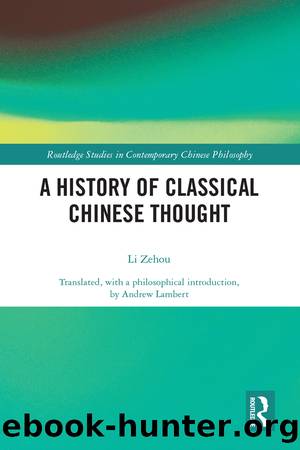A History of Classical Chinese Thought by Li Zehou;

Author:Li, Zehou;
Language: eng
Format: epub
Publisher: Taylor & Francis Group
Published: 2020-06-15T00:00:00+00:00
The two passages are almost identical. Both are fantastical and completely inaccurate. However, both are similarly scientific at certain points. Consider the following: “The sky is overcast before rain, and a person has symptoms before then falling ill. This is due to a rise in Yin forces…. A patient feels worse at night and roosters crow at dawn…. This is due to diminishment or accumulation of yin or yang qi energy” (Chunqiu fanlu, Tonglei xiangdong” 同類相助 section).93 This passage is not far removed from the Huangdi Neijing’s accounts of physiology and pathology. Both using material forms of yin and yang qi to explain the mutual responsiveness of the heavens (here understood as day and night) and humanity (here understood in terms of the body and disease). In addition, both the Chunqiu fanlu and the Huangdi Neijing authors believed that qualitatively different but structurally analogous things and events could mutually influence each other. For example, summer, Southerly winds, heat, fire, day time, red, and bitter flavors constituted a series of connected types, as did winter, Northerly winds, cold, water, white, and sweet flavors. Having different properties but similar structures they were able to interact. Just as Dong’s political theories touched upon how the biological of the human body was implicated in the mutual responsiveness of humans and the cosmos, so the Huangdi Neijing’s medical theories also discussed the interactions of humans and the cosmos in political terms.94
East begets wind and wind nourishes wood. Its feature is tender, and its function is to nurture. Its power is to unlesh Yang, while its order is wind. West begets dryness and dryness adds vigor to air or metal. The feature of metal is clear, and its function is to restrain. Its power is sharp.
The reception of the two texts differs greatly, and there is a great difference in terms of guiding ideology and extent to which their claims are taken to be reliable. Nevertheless, they share the same contemporary philosophical worldview—a cosmology rooted in systems theory. In the biography of Dong Zhongshu in the Han Shu, we learn that the Martial Emperor, Han Wudi, said,
I have heard that those skilled at speaking about the Heavens are able to justify their claims through reference to the humanity, and those skilled at discussing the past can point to experiences in the present
(Han Shu, ‘Biography of Dong Zhongshu’).95
In the Neijing, the Yellow Emperor said,
I have heard that those skilled at speaking about the Heavens are surely able to respond to the human. Those skilled at speaking about the past are surely able to point to experiences in the present. Those good at talking about qi energy are able to make clear how this relates to things. Those skilled at explaining interactions follow the changes in the Heavens and Earth. Those skilled at describing change and transformation follow the patterning of the noumenal and illustrious.
(Huangdi Neijing, Suwen classic, “Qijiao biandalun” 氣交變大論)96
Download
This site does not store any files on its server. We only index and link to content provided by other sites. Please contact the content providers to delete copyright contents if any and email us, we'll remove relevant links or contents immediately.
The remains of the day by Kazuo Ishiguro(7543)
Tools of Titans by Timothy Ferriss(6937)
The Black Swan by Nassim Nicholas Taleb(6184)
Inner Engineering: A Yogi's Guide to Joy by Sadhguru(5887)
Giovanni's Room by James Baldwin(5873)
The Way of Zen by Alan W. Watts(5790)
The Six Wives Of Henry VIII (WOMEN IN HISTORY) by Fraser Antonia(4785)
The Power of Now: A Guide to Spiritual Enlightenment by Eckhart Tolle(4749)
Astrophysics for People in a Hurry by Neil DeGrasse Tyson(4614)
Asking the Right Questions: A Guide to Critical Thinking by M. Neil Browne & Stuart M. Keeley(4566)
12 Rules for Life by Jordan B. Peterson(3724)
The Ethical Slut by Janet W. Hardy(3494)
Skin in the Game by Nassim Nicholas Taleb(3456)
Housekeeping by Marilynne Robinson(3396)
The Art of Happiness by The Dalai Lama(3378)
Double Down (Diary of a Wimpy Kid Book 11) by Jeff Kinney(3267)
Skin in the Game: Hidden Asymmetries in Daily Life by Nassim Nicholas Taleb(3259)
Walking by Henry David Thoreau(3228)
12 Rules for Life: An Antidote to Chaos by Jordan B. Peterson(3196)
